Why Secularists Calling for a Christian Revival Are Wrong
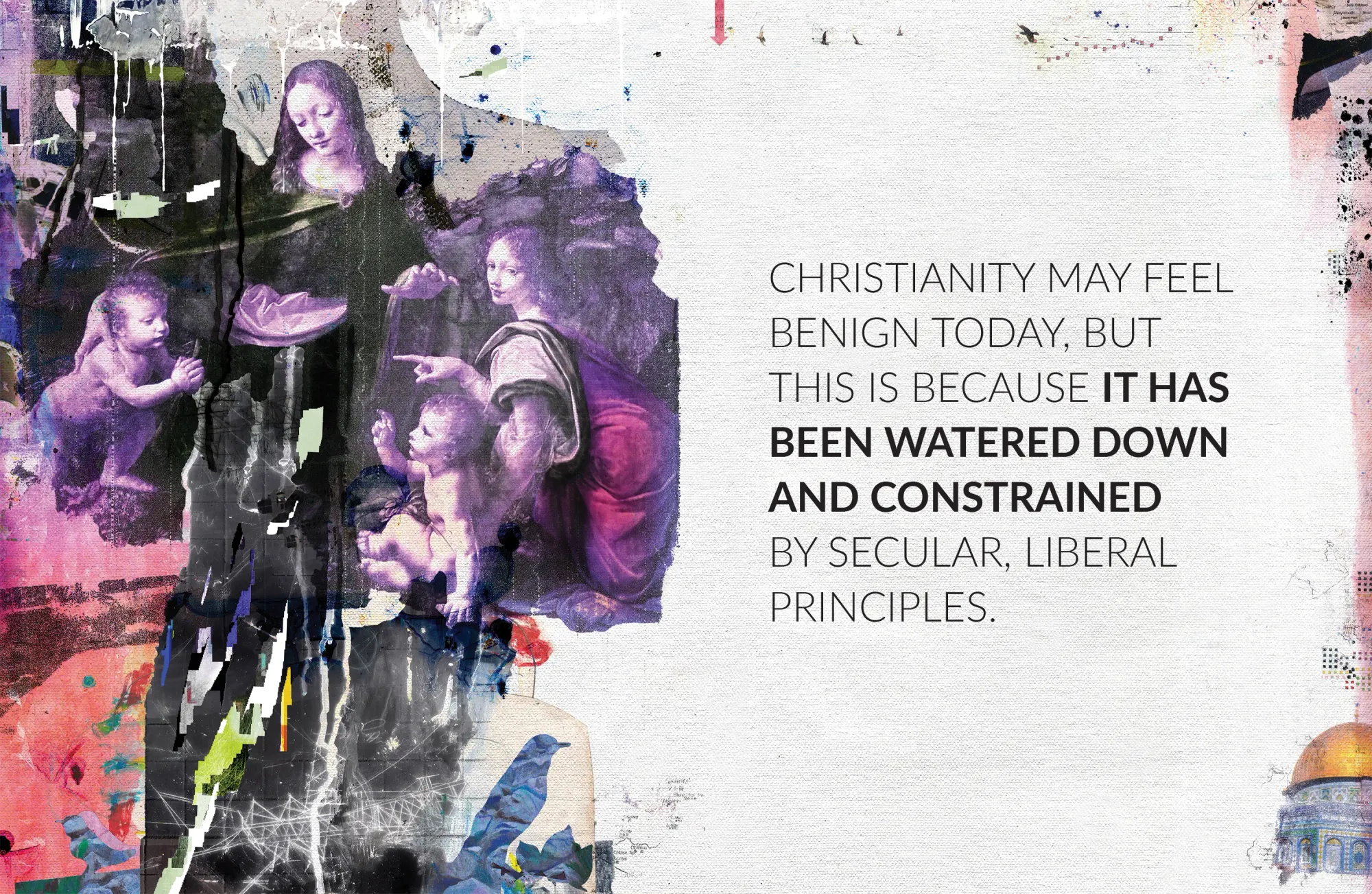
Many readers will be well aware of the growing cultural narrative that what we need right now is a revival of Christianity.1, 2, 3 When held by Christians, this stance requires little explanation—they believe Christianity to be true and the only way to salvation. Believing something to be true is a perfectly valid reason for trying to increase belief in it. Much more puzzling is the number of atheists and skeptics who have increasingly taken this position.4, 5 Despite their still not believing Christianity to be true, they nevertheless think greater adherence to it has the potential to fix, or at least ameliorate, societal problems. Common arguments for this position are, I would argue, based on existential angst, historical revisionism, and a simple failure to understand human psychology.
So, how did we get here? As Jonathan Haidt has noted,6 drawing on the World Values Survey,7 when societies become industrialized, wealthy, and stable they move away from “traditional values” emphasizing religion, ritual, and deference to authority, and from “survival values” rooted in tribal identity. Instead, they shift toward “secular and rational” values that emphasize material reality, liberal values, and individual liberty. If this sense of stability is shaken, however, people often retreat to religious and tribal values. The current surge of enthusiasm for religion, along with support for populist “strongman” leaders, likely reflects a growing sense of instability and existential angst. Political polarization, wokeness, tensions over immigration, the illiberal populist right, the rising cost of living, lingering distrust of experts following conflicting COVID policies, unaffordable housing, and geopolitical conflicts all contribute to increasing anxiety and resentment.
That religious believers should lean more heavily on their faith in difficult times is not surprising, but atheists who do not believe God exists, let alone cares about humans, cannot possibly think that petitionary prayer or hope for divine intervention will rescue society from those evils. Those taking a pro-religion stance, thus, offer a range of pragmatic, cultural arguments. A common claim is that humans have a deep psychological need for religion—a Godshaped hole crying out to be filled. Related to this is the idea that Christianity is somehow inherently benign and provides a defense against far worse ideologies, particularly wokeness and Islam. Some argue that Christianity brings structure, order, a unifying narrative, and a sense of the common good that can reduce societal and political polarization. Others claim that all the positive things we value in society—science, reason, liberty, and democracy— are derived from and reliant on Christian values.
These arguments largely ignore history and are based on an idealistic concept of human psychology. Many of them can only be made by atheists, or at least by individuals whose belief in Christianity is metaphorical rather than literal. Those who have never believed literally in Christianity or an afterlife are prone to not truly comprehend that other people do, or appreciate the likely consequences thereof. I address these arguments as someone with an academic background in Christian history in England from 1300 to 1700, and as someone who once believed in Christianity quite literally indeed and who has since seen the value of secular, liberal values.
The “God-Shaped Hole” or “Substitution” Hypothesis
For many, the claim that humans need religion feels compelling. While religions are culturally specific, the human tendency toward religiosity seems to have existed for as long as humans have,8 though religious intensity varies by culture, era, and individual.9 Some atheists and skeptics from historically Christian countries who feel no personal need for religion nevertheless perceive that it fulfills social and psychological needs for many others.10 They argue that the decline of religion creates a “God-shaped hole” that inevitably gets filled by secular substitutes that are worse for society than traditional religion, specifically Christianity.
Yet, it is not clear that the decline of religion directly causes the rise of secular ideologies. The “substitution” hypothesis is most often raised in the U.S. in relation to the Critical Social Justice (CSJ) or woke movement, but if CSJ arose because of declining religion, the last place we’d expect to see its leading theorists emerge is America—a country whose religiosity is closer to Iran’s than to the rest of the English speaking world.11 That the U.S., with its unusually high level of religiosity, was also the birthplace of Critical Race Theory, Queer Theory, and postmodern variations on Postcolonial Theory argues against the substitution hypothesis, not for it. Many vastly more secular countries, where nonbelievers represent the majority of the population (such as the Netherlands or the Czech Republic), have not produced similarly fervent ideologies in absence of religion.
The Christian culture of America, with its history of “Awakenings,” undoubtedly shaped the character of the recent “Awokening.” Wokeness would probably look very different had it not developed in a culture steeped in evangelical Christianity. Nevertheless, the zeal, evangelical fervor, and sense of being uniquely awakened to a reality to which others are blind exhibited by a subset of Americans represent, I submit, a specific cultural continuity rather than a universal human need for religion.
Atheists and skeptics would do better to ask why so many people across the West now seek security in dogmatic, illiberal ideologies, and to address the material causes of that insecurity, rather than advocating for a Christian psychological crutch as being preferable to a secular one. We could be of most use in exploring ways to reduce material deprivation, ease existential anxiety, address political polarization, and meet human social and psychological needs in ways that don’t jeopardize the rights of women, homosexuals, and atheists, and that also have the benefit of being true.
Christianity is inherently benign.
The “God-Shaped Hole” or “Substitution” hypothesis relies on the contention that Christianity is benign, especially in comparison to other ideologies competing for social power and prestige, particularly Islam and wokeism. This claim, when applied to mainstream Christianity in the West, is defensible. Although authoritarian, extremist sects of Christianity exist, mainstream denominations of Christianity are largely supportive of the rights and freedoms of non-Christians under the law and have come to respect the moral equality and autonomy of women. Some are even accepting of same-sex relationships.
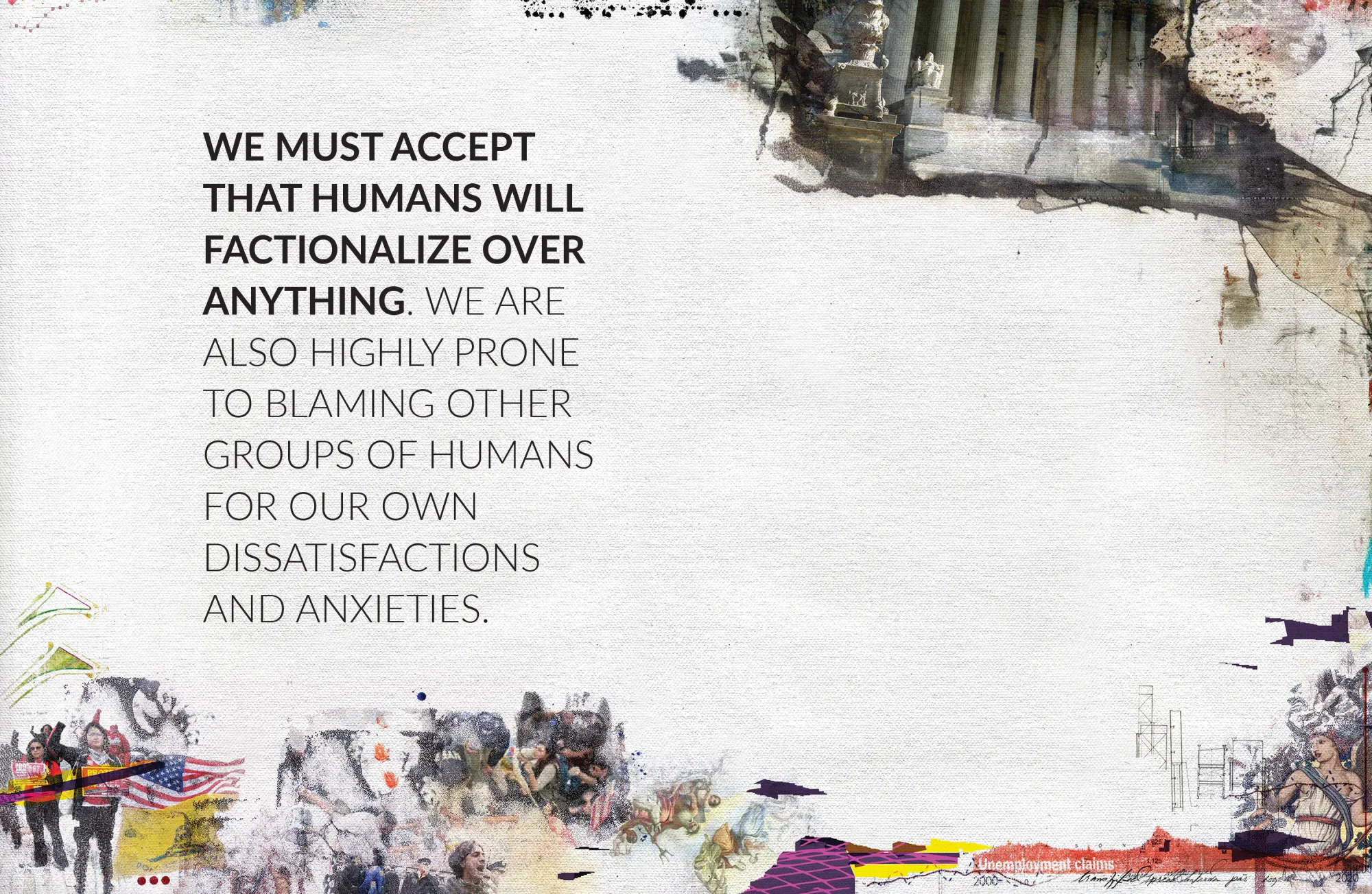
We should, however, consider why Christianity manifests itself this way in contemporary Western societies. Christian apologists frequently quote Richard Dawkins: “I have mixed feelings about the decline of Christianity, in so far as Christianity might be a bulwark against something worse.” Dawkins, however, was explicitly referring to current manifestations of Christianity and its material impacts, contrasted with current manifestations of Islam and its material impacts.12, 13 Islam, as practiced in predominantly Muslim countries, is not known for its tolerance of the rights and freedoms of non-Muslims, nor for those of women and sexual minorities.
Why the difference? For much of history, this was not the case. In some centuries, the Muslim world had stronger legal protections for religious minorities than Christendom did, (although the liberal nature of the Islamic “Golden Age” is frequently overstated). Jews and Christians in Muslim lands paid higher taxes and had to practice their faith in private, while in Christendom, Jews and Muslims often faced the starker choice of conversion, expulsion, or death. In both contexts, women were subordinated to men and homosexuality was punishable by death. The progressive shift that occurred in Christian thinking on these issues in the Western world and corresponding regressive one in the Muslim world can largely be explained by the increasing power and influence of Europe on the world stage and the decline of the Islamic world and finally of the Ottoman Empire. The dominance of Europe created a degree of security that provided breathing space for the development of Enlightenment thought, liberal philosophy, and the concept of secularism.
Christianity feels safe and benign in the contemporary Western world because liberal secularism stripped it of institutional power. The spirit of secularism has also been accepted as a cultural norm, including by Christians who were instrumental in establishing it, primarily to protect minority denominations, particularly in an American context. The majority of Christians now accept that their right to their faith is protected, but so too is other people’s right not to practice their faith, or to do so differently. Mainstream Christianity, under liberalism, has become pluralistic and tolerant.14, 15, 16
Atheists who assert that Christianity is inherently more liberal than Islam are therefore comparing liberal manifestations of Christianity with authoritarian manifestations of Islam. If Christianity were given the same institutional power and right of imposition that Islam has in many predominantly Muslim countries, and especially if this were to happen in our current climate of existential anxiety and polarization, I suspect few atheists would regard the outcome as benign. Likewise, the societal damage done by the Critical Social Justice movement came not from its mere existence but from its institutionalization, which enabled believers to impose it on others. If wokeness had remained a voluntary community of believers, imposing its tenets only on its congregation as we expect Christian churches to do, it would not have become a primary driver of the culture wars.
We would do well to learn from this and put our energies behind expanding the liberal concept of secularism to ensure that adherents to both religious and nonreligious ideologies can hold only their own voluntary communities accountable to their belief system rather than the whole of society. We should resist any drive to give Christianity either the hard legal power and influence that Islam has in predominantly Muslim countries or the soft cultural power wokeness has had in our own.
“Real Christianity Has Never Been Tried.”
Central to believing Christianity to be benign based on its currently liberal manifestation is the belief that the religion is inherently benevolent, tolerant, and nonauthoritarian. Many Christians, along with those who think well of Christianity, are inclined to refer to scripture to make this claim. There is validity to this claim. Individuals who commit themselves to trying to live a life that is Christ-like—loving their enemies, casting not the first stone, caring about the sick and poor—are some of the most benevolent, forgiving, prosocial, and generally delightful people one can ever hope to meet. Nevertheless, this is not how Christianity has impacted society when it has had legal or social power and influence. This claim can consequently be understood as a “Real Christianity has never been tried” argument.
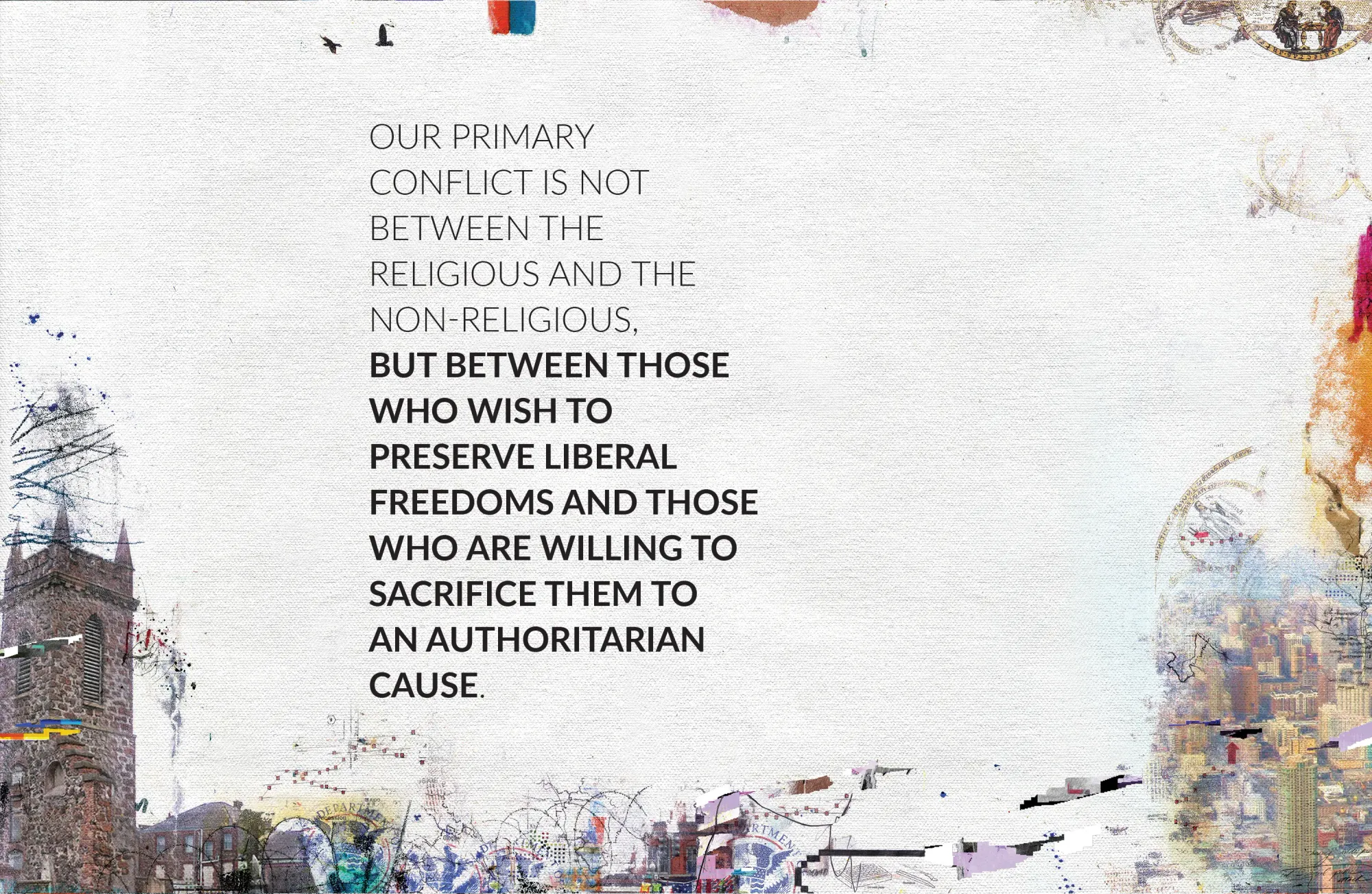
Christianity’s tendency toward authoritarianism does not arise because Christians are any more inherently authoritarian than anybody else, but because Christianity, like Islam, is a proselytizing religion that teaches eternal damnation for nonbelievers and insists there is only one path to salvation. It is counterintuitive for good people who care about the well-being of their fellow human beings not to become authoritarian if they truly believe others face eternal torment for a mistaken belief.17, 18, 19As a literalist Christian myself in my teenage years, I have experienced this conflict between caring about other people’s well-being and respecting their freedom of belief. It feels like seeing a blind person about to walk off a cliff, but she will not believe you that the cliff is there. Would you respect her right to be wrong and watch her plummet to her death, or would you seize hold of her and drag her, kicking and screaming, away from the edge, knowing that she will ultimately appreciate this when she learns the truth?
Atheists who regard religion positively in a largely metaphorical or symbolic way often struggle most to comprehend that others believe literally in God, Heaven, and Hell. Because they themselves regard religion abstractly as some kind of narrative framework useful for meeting human social and psychological needs, they are prone to assuming that believers in the religion do too. They are then frequently mystified when some are willing to kill and die for their faith, or impose it on others by force, in the conviction that eternal destinies are at stake.20, 21, 22
It can be useful for those who struggle to intuitively comprehend these stakes to engage in a thought experiment. Imagine it were just factually true that all those who do not accept Christ as their savior will spend eternity in Hell. Now, spend time visualizing Hell and humans suffering in it. What would you be willing to do to save them from that fate? Then accept that some other people do believe this is literally true. We should never underestimate the power of religious conviction to make otherwise good people do bad things. Even patriotic Christians committed to their nations’ constitutions can morally justify voting away other people’s religious freedom if they believe that by doing so, they can save their fellow citizens and future generations from eternal damnation.
Any discussion of reversing religious decline must therefore be grounded in literal, not metaphorical, understanding of Christian beliefs, and in historical and geographical evidence of what societies dominated by strong religious conviction look like. While Christianity in liberal democracies has absorbed a “live and let live” ethos, there is no guarantee it will hold to it if literal God-belief grows while our commitment to evidence-based epistemology, reason, and liberal expectations of secularism falls. Upholding the skeptical fruits of the Enlightenment is surely the “one job” of secularists.
The Myth of Past Harmony Under Christianity
Some argue that while Christianity may not be inherently benign, it did at least unify people and bring them together. Our current culture wars and polarization problems, we are likely to hear, exist because we are fragmented and do not have shared values and a sense of the common good. When our societies were religiously homogeneous, they were much more peaceful and harmonious. Therefore, the argument goes, we can improve matters with a drive to make them religiously homogeneous again.
My studies of Christianity in England from 1300 to 1700 have convinced me that this is ahistorical nonsense. Humans are not known for uniting around a single vision of the common good. This is why there are 45,000 denominations of Christianity worldwide, and several hundred different enough for people to have been willing to kill and die over interpretations.23, 24, 25, 26 In England, when everybody was expected to be the same kind of Christian and nearly everybody actually was Christian because knowledge of other religions was very limited and nonreligion was virtually unthinkable, there was a degree of fighting and bloodshed on denominational grounds that should make us entirely reset our curve for what constitutes a culture war.27 Americans should be particularly conscious of this given that the first settlers were dissident Protestants fleeing persecution from establishment Protestants.
Nor did the cultural dominance of Christianity ever prevent other forms of conflict. The history of England is one of aristocratic families battling for political power, bishops and merchants clashing for influence, and farming practices and boundary disputes fueling a constant source of conflict for large and small landowners. Guilds factionalized. Peasants revolted. Towns distrusted their neighbors, referring to inhabitants as “foreigners” and suspecting them of barbaric practices. The roles of women and class divisions were a constant source of conflict, especially in the decades following the Black Death when the demand for labor exceeded the supply. Parish records and surviving sermons bear testimony to the bitter internal politics of single church communities as priests tried to resolve deeply polarized issues and long-standing feuds.
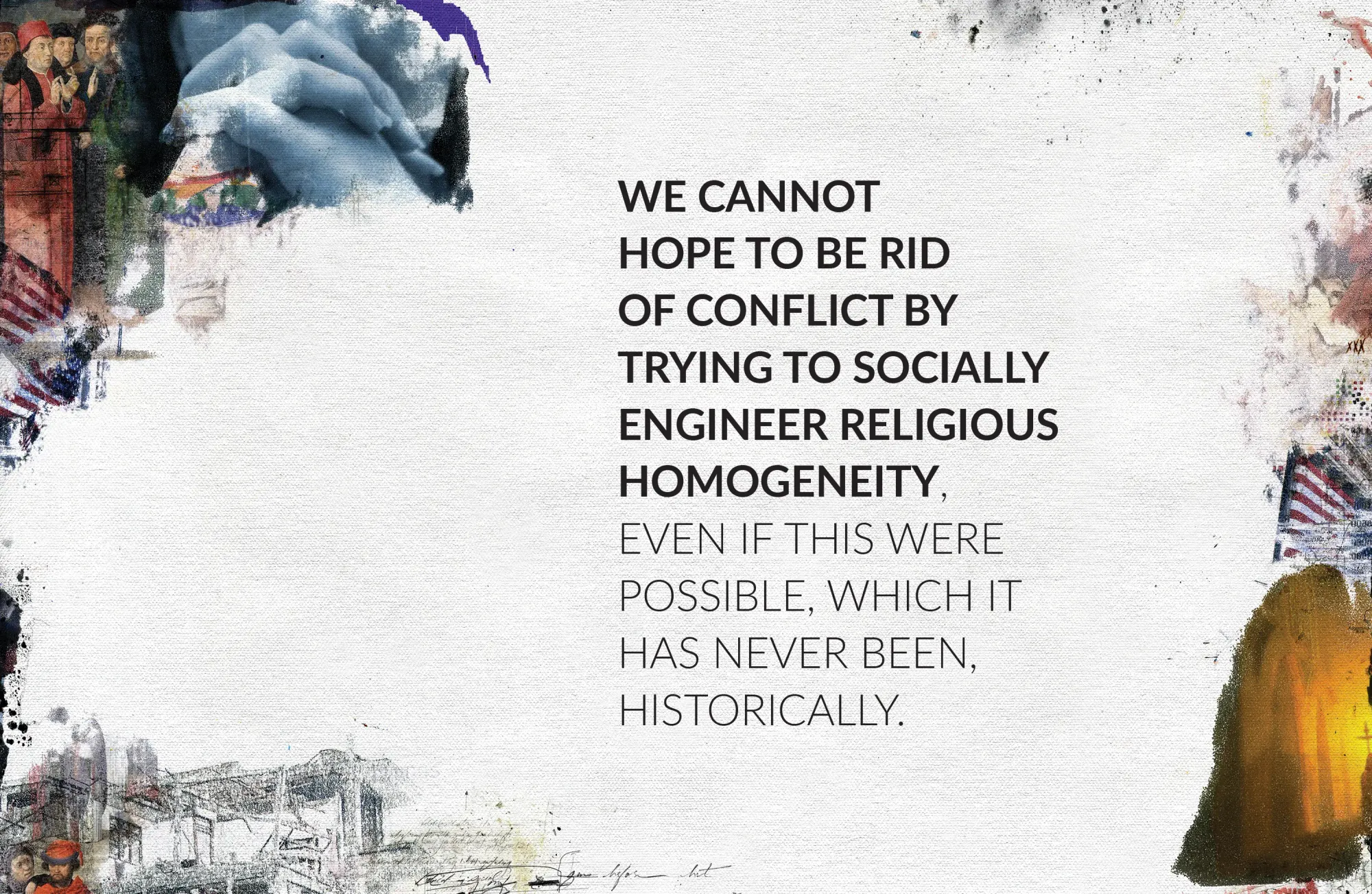
We must accept that humans will factionalize over anything. We are also highly prone to blaming other groups of humans for our own dissatisfactions and anxieties. It is probably not a coincidence that the Black Lives Matter protests of 2020 exploded into existence just after a pandemic was announced. Jewish pogroms have frequently correlated with outbreaks of plague. All too often, we seek to alleviate anxiety by finding an enemy we can fight. Factionalism and intergroup conflict are written into our tribal, territorial ape brains and so cannot be resolved by trying to artificially engineer a reduction in the number of external differences that we can fight about. If the material sources of anxiety remain, we will simply narrow our scope to differences that remain and fight over those. Jonathan Swift captured this in his 1726 novel Gulliver’s Travels, with his satire of factions warring over which end of a boiled egg to break!
This is, again, not to dismiss the validity of serious cultural disputes over issues, such as immigration, ever-increasing income inequality, and cultural compatibilities, or of rising political extremism and polarization that need to be addressed specifically. However, we must do this by addressing each of those issues as they really are. We cannot hope to be rid of conflict by trying to socially engineer religious homogeneity, even if this were possible, which it has never been, historically.
The only thing that has most reduced religious—or any kind of—conflict and achieved a level of relatively peaceful coexistence has been the development of liberal principles that protected freedom of belief and speech, and actively encouraged a marketplace of ideas for the purposes of advancing knowledge and resolving conflict without bloodshed.
Christianity as the Source of Modernity?
A final nostalgic but ahistorical claim is that the defining features of modernity—Enlightenment thought, the scientific revolution, scholarship, liberalism, human rights, and democracy—were products of Christianity. From this follows the argument that preserving Christianity is essential to preserving these values. This assumes that because Christianity was culturally dominant when these particular cultural phenomena emerged, it must have been directly responsible for them.
In reality, there are always multiple ideas, cultural discourses, belief systems, and ethical frameworks having an intellectual influence on a society at the same time. The ways in which they interact, branch, or are continuous or contradictory with pre-existing ideas are complex. Christianity is itself derived from Judaism, was deeply shaped by Greco-Roman philosophy (especially Neo-Platonism by way of Augustine), and absorbed elements of various displaced pagan traditions. Its interpretations evolved further in response to later intellectual and cultural shifts.
Comparatively little non-Christian philosophy emerged between Christianity’s ascendancy and the Renaissance. A shift came with the Reformation. Protestant insistence that individuals be allowed to read scripture for themselves and the exhortation to “know thyself”28 encouraged literacy, self-examination, the study of the natural world, and critical inquiry. This resulted in people questioning whether scripture was true at all, and we see evidence of atheism in the emergence of texts arguing against it in the 1590s.29 Combined with the Renaissance revival of Greco-Roman thought and a more positive view of art and science, these developments seeded the skeptical and inquisitive culture that enabled the Enlightenment, the scientific revolution, and liberal democracy. Many believing Christians were, of course, instrumental in these developments, but Church authorities were frequently ambivalent at best and, at worst, resistant. Christianity often served as a counter-Enlightenment force, and biblical literalism still fuels science denial today.
When we think of “Western Civilization” we typically think of Western modernity and its culture of innovation, exploration, and the rapid development of science, reason-based philosophy, individual liberty, and the growing influence of the West on the world stage. These distinguish the modern from the medieval period, which was defined largely by adherence to Catholicism. When people from other parts of the world describe someone as “Westernized” (often critically), they mean they have adopted concepts of individual liberty, not Christianity.30 Nowhere is this clearer than in the founding of the United States, built explicitly on liberal principles of unalienable individual rights to “life, liberty, and the pursuit of happiness.” American Christians have reconciled their faith with these ideals, but it is difficult to argue that they are intrinsically Christian ones.31, 32, 33, 34, 35
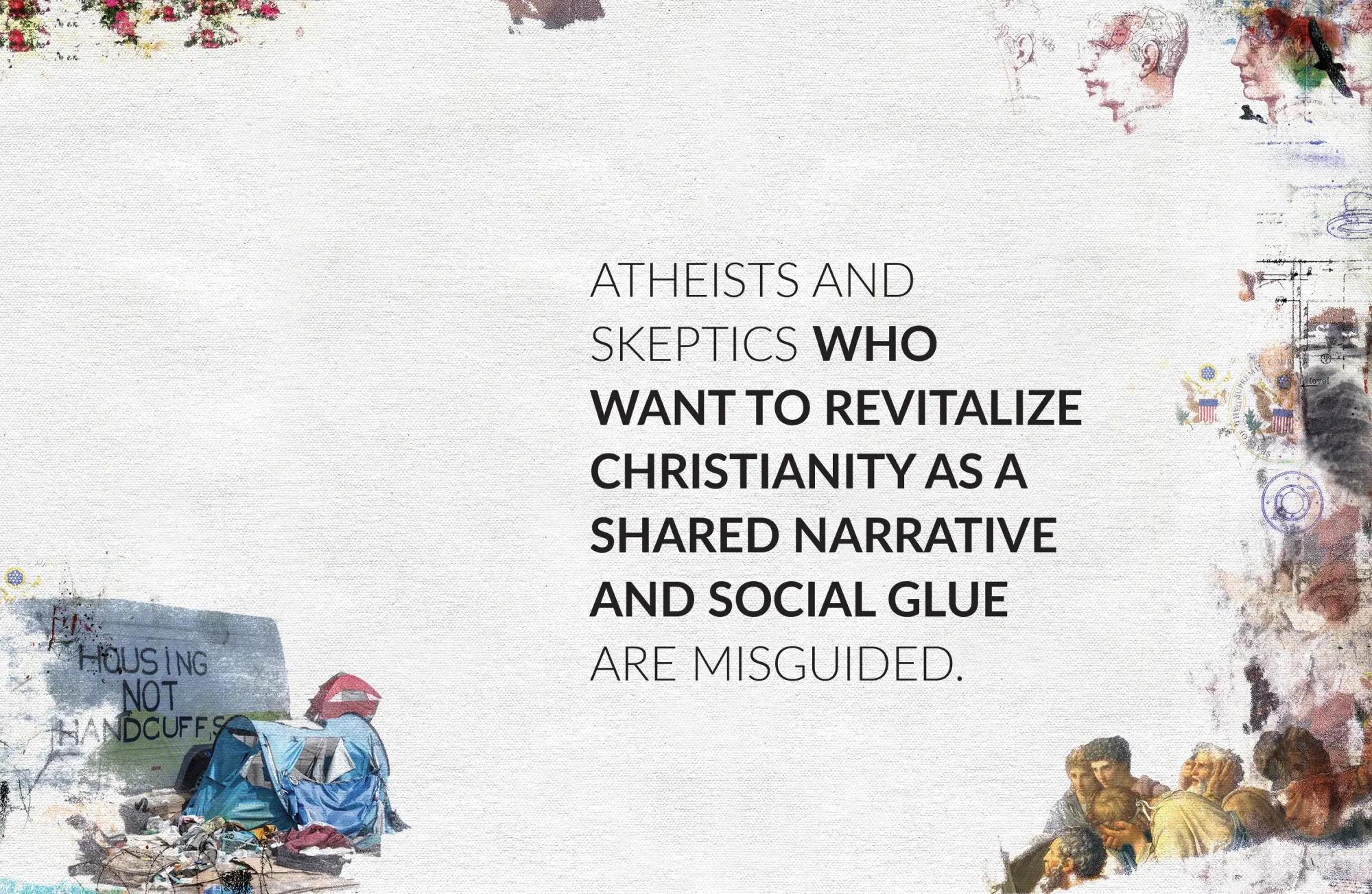
Atheists and skeptics who want to revitalize Christianity as a shared narrative and social glue are misguided. Their case rests on anxiety, revisionist history, and nostalgia for a culture that never existed. Christianity’s appeal for nonbelievers lies in its comforting story, sense of belonging, and appearance as a bulwark against worse alternatives. But the historical and philosophical claims for revival do not withstand scrutiny. Christianity has never unified humanity into harmony; it has often been a source of factionalism and bloodshed. Western liberal modernity was not the offspring of Christianity but the achievement of a centuries long line of inquiring minds (some religious, many not), bringing forth skeptical, secular, and pluralist ideas that developed, frequently in struggle against religious authority.
Indeed, Christianity may feel benign today, but this is because it has been watered down and constrained by secular, liberal principles. Its authoritarian tendencies, like those of any proselytizing faith that promises salvation or damnation, are still inherent within it and would be particularly likely to be activated were it to resurge into a culture already experiencing an alarming rise in radical and authoritarian ideological movements. This is the soil in which religious revivalism and illiberal, identitarian movements like Critical Social Justice and White Nationalism, and other forms of emotional populism, whether from the Left, the Right, or some incoherent amalgam of both, take root and sprout.
Religiosity may be a manifestation of innate human tendencies heightened in times of existential anxiety, but religion cannot resolve the material causes of that anxiety. Atheists and skeptics who flirt with pro-Christian arguments are right to fear militant Islamism and woke authoritarianism, but wrong to imagine that a return to Christianity will protect them. The real safeguard is not mass commitment to any orthodoxy, but a principled commitment to secular liberalism. Rather than replacing one orthodoxy with another, we should strengthen those cultural and political frameworks that allow us to live together without coercion.
There are some who claim that liberalism has failed and the ability of authoritarian ideologies to gain social dominance is evidence of this. This claim misstates the problem. Liberalism, understood in its philosophical sense, is the opposition to authoritarianism and strong legal and social protection of individual liberty. Authoritarianism did not arise because we have been protecting freedom of belief and speech strongly. It arose because we have not been doing so. It is the weakening of that commitment and those protections that has enabled authoritarian ideologies to gain power unchecked. People who wish to revitalize Christianity and claim liberalism has failed because it did not hold back the authoritarian CSJ movement do not typically claim that Christianity has also failed because it did not hold back the movement either. They claim that we need to reverse the decline of Christianity. Those of us who do not wish to be canceled for not being Christian any more than we wish to be canceled for not upholding the tenets of CSJ would do better to focus on reversing the decline of liberalism.
This is not to say that those of us who want to conserve the liberal philosophical underpinnings of Western modernity are ranged against the majority of Christians on this issue. Christians have been instrumental in upholding liberal democracy and constitutional freedoms. They, too, benefit from the separation of church and state, and typically sincerely wish to live in peace alongside people who do not share their beliefs. We can work together. Our primary conflict is not between the religious and the nonreligious, but between those who wish to preserve liberal freedoms and those who are willing to sacrifice them to an authoritarian cause.
I urge skeptics to recognize themselves as heirs of the Enlightenment and not to try to resurrect Christianity, but to rekindle confidence in the liberal tradition that made modern Western civilization possible: a tradition that values evidence, reason, pluralism, and the rights of individuals. If we wish to reduce polarization, mitigate existential anxiety, address real problems effectively, and build a society resilient to authoritarian capture, we must invest in those principles rather than retreat to the false comfort of religious narratives. Liberal modernity is imperfect, but it remains the best system for advancing knowledge and resolving conflict that humanity has ever known. Our challenge now must be to ensure it endures.